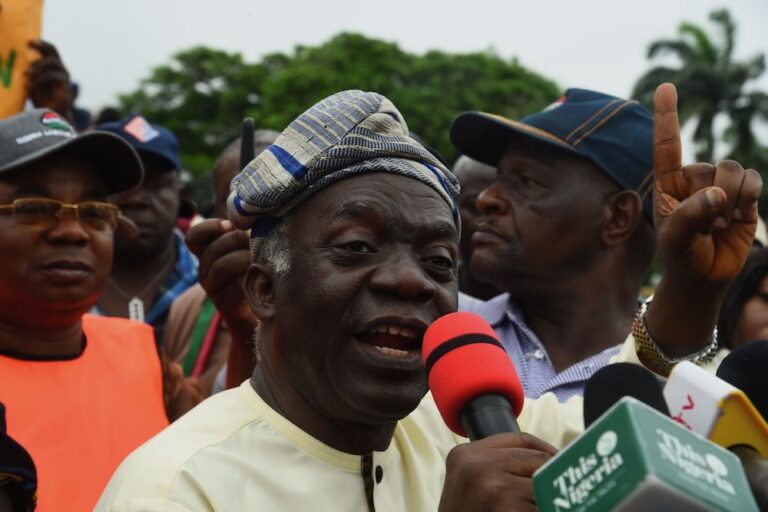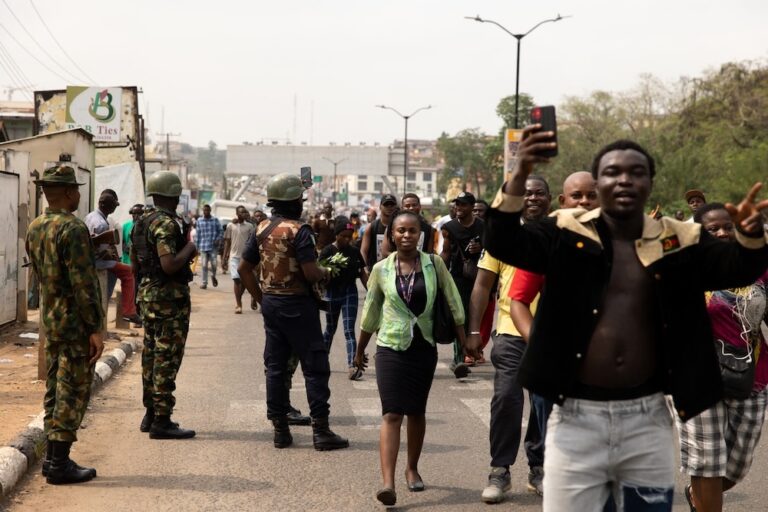(MRA/IFEX) – A one-day conference to commemorate the 2009 World Press Freedom Day was held in Lagos on Monday, May 4, 2009. Organized by the United Nations Information Centre (UNIC) in Lagos and Media Rights Agenda (MRA), the conference brought together scores of media owners, media managers, editors and other media professionals as well as […]
(MRA/IFEX) – A one-day conference to commemorate the 2009 World Press Freedom Day was held in Lagos on Monday, May 4, 2009. Organized by the United Nations Information Centre (UNIC) in Lagos and Media Rights Agenda (MRA), the conference brought together scores of media owners, media managers, editors and other media professionals as well as representatives of civil society and other stakeholder groups to discuss the conference theme: “The Role of the Media in Fostering Dialogue and Mutual Understanding between the Government and the People”.
Mr. Tetsuo M. Ohno, the Director of the United Nations Information Centre, made welcome remarks and read the UN Secretary General’s statement. In it, he reiterated the central importance of the right to freedom of expression and the need to protect journalists and media outlets on the frontlines of exercising it, observing that “attacks on journalists remain shockingly high in number.”
The Secretary General noted that the annual observance of World Press Freedom Day is also an opportunity to reflect on the important role of the media in addressing global problems as “the press plays a vital role in challenging entrenched attitudes about religious, political or other differences among people.” He advised that governments that stifle or otherwise obstruct this work are acting against their own best interests and that of their societies.
Mr. Edetaen Ojo, the Executive Director of Media Rights Agenda also made opening remarks while Mr. Olusegun Adeniyi, Special Adviser on Communications to President Umaru Yar’Adua, delivered the Keynote Address, which explored the theme of the conference. Mr. Lanre Arogundade, Coordinator of the International Press Centre (IPC) in Lagos, led discussions on the presentation and the issues raised.
Conference participants thereafter discussed issues relating to media practice and capacity in Nigeria, particularly the role of media in governance and development, key elements of effective media monitoring of government, independence, quality and reach of the media, as well as the relationship between the government, the media and the people.
Conference participants hereby adopt this Final Statement:
– the conference notes that effective functioning of any democratic system of government depends on a two-way flow of information between the government and the people which a dialogue can engender. This is because it helps governments to understand what the people’s needs and priorities are and creates the possibility for the people’s perspectives and concerns to be reflected in policy decisions. It also enables the people to know what is going on in government, to determine whether the government is serving their interests and assists them in making important personal, professional and political choices and decisions that are crucial to their wellbeing.
– the conference notes that Section 22 of the 1999 Constitution enjoins the press, radio, television and other agencies of the mass media to uphold the responsibility and accountability of the government to the people. However, for the media to be effective in carrying out this duty, media practitioners require, among other things, access to governmental information.
– the conference observes that various laws, regulations and practices of government institutions, including the routine administration of oaths of secrecy on public officers, serve to impede access to information for media practitioners as well as for other citizens. It is further observed that such a situation, which creates a shroud of secrecy around government, cannot foster dialogue and mutual understanding between the government and the people.
– the conference therefore calls on the federal government, particularly the National Assembly and the President, to take urgent steps to pass into law the Freedom of Information Bill, which has been pending before the Legislature since 1999.
– the conference suggests that those who manage government information should make themselves and the information about government programmes, policies and activities more readily available to the media to facilitate better dialogue and more effective engagement.
– the conference advises journalists to improve their knowledge about a wide range of issues to equip themselves to be able to assess critical issues when reporting on the government
– the conference urges the media to take a broader view of government as against the present narrow approach, which tends to focus excessively and disproportionately on the Executive arm. Greater attention and scrutiny should be given to other arms of government as well.
– the conference urges the government to provide appropriate funding and necessary infrastructure for the media establishments it has created to function efficiently and effectively.
– the conference suggests that strategies should be adopted to ensure information dissemination at grassroots levels, especially in rural communities, as these sectors of society are often deprived of effective access to the media and critical information. In this regard, the federal government should create an environment that will enable the establishment of community radios across the country to provide a voice for people at the grassroots level.
– the conference calls for the adoption of new technologies in media practices, including upgrading the capacity of mass communication and journalism training institutions to provide training for new entrants on the use and application of these new technologies.
– the conference calls for the creation of multiple channels and platforms for continuous and sustainable engagement between the media and the President.


